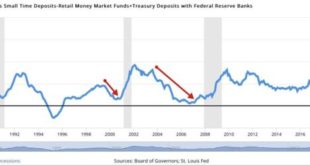Recently, I published an article in the Mises Wire, “Woke Egalitarianism and the Elites,” in which I presented the true intentions behind woke egalitarianism. The article also described how elites attempt to rebuild society through collectivism. But more than discussing the goals of progressivism, we need to discuss the intellectual basis of these attempts. What assumptions and intellectual framework guide these actions? Progressivism is based on a disrespect of...
Read More »Losing Control of Money
With global worldwide debt now over $300 trillion and interest rates rising, the US dollar is once again a relative safe haven in a slowing economy. Currencies competing with the Dollar face a deadly race to stave off a sovereign debt crisis. Is the dollar now unbound, as the dominant political tool of the dominant nation? The Dollar Milkshake Theory: Mises.org/HAP385a Thorsten Polleit, The Global Currency Plot: Mises.org/HAP385b Bob's book, Understanding Money...
Read More »When Military Strategy Ignores Economics: The Sad Story of Rear Admiral Alfred Thayer Mahan
It is a great tragedy that many modern military leaders and strategists do not understand economics. If they did, I suspect that there would be a lot less war, a lot less military spending, and a lot less wastefulness. Certainly, there would be greater awareness of the appalling human and economic costs of war in a capitalist age. Ludwig von Mises, the great Austrian economist, understood this point well. In his 1927 book Liberalism, he noted that as late as the...
Read More »Biden versus Bastiat
President Biden's recent call to "buy American" is doomed to failure, just like all other protectionist schemes. Original Article: "Biden versus Bastiat" This Audio Mises Wire is generously sponsored by Christopher Condon. [embedded content] Tags: Featured,newsletter
Read More »Once More unto the Veatch
Human Rights: Fact or Fancy?by Henry B. VeatchLSU Press, 1985; xii + 258 pp. Henry Veatch was one of the foremost philosophers of the twentieth century, though sadly neglected by most contemporary analytic philosophers. He was a resolute defender of Aristotelian ethics against rival ethical systems, and in this week’s column, I’d like to look at an argument which he deploys against these rivals in his book Human Rights: Fact or Fancy? The argument is this. A system...
Read More »Secession: Should the American Revolutionaries Have Quit to Appease the Loyalists?
Opponents of secession say secession is wrong if some people in the population don't want it and say they will be worse off. The American revolutionaries disagreed and seceded anyway. Original Article: "Secession: Should the American Revolutionaries Have Quit to Appease the Loyalists?" This Audio Mises Wire is generously sponsored by Christopher Condon. [embedded content]...
Read More »Public Transit Projects Are the Perfect Recipe for Financial Disaster
The largest urban mass-transit systems across the US are entering an all too familiar point in their long history: another looming financial disaster caused by financial mismanagement and the consequences of covid. No urban transit system exemplifies this problem more than the Metropolitan Transportation Authority (MTA) in New York. Ridership in New York has not rebounded to precovid levels, and the MTA is projected to have a funding gap of $1.6 billion in 2026...
Read More »Poor People in Developing Countries Find Alternatives to Commercial Banking
People are innovative—if government doesn't get in the way. Entrepreneurs in developing countries find alternatives for people cut off from commercial banking services. Original Article: "Poor People in Developing Countries Find Alternatives to Commercial Banking" This Audio Mises Wire is generously sponsored by Christopher Condon. [embedded content]...
Read More »The Impossibility of Equality
[Excerpt from chapter 7 of Power and Market in Man, Economy, and State with Power and Market, pp. 1308–12.] Probably the most common ethical criticism of the market economy is that it fails to achieve the goal of equality. Equality has been championed on various “economic” grounds, such as minimum social sacrifice or the diminishing marginal utility of money (see the chapter on taxation above). But in recent years economists have recognized that they cannot justify...
Read More »The Coming Recession Will Be a Global One
Over one hundred years ago, Austrian economist Ludwig von Mises discovered what causes the boom-bust business cycle. As Mises explained, the boom is caused by central and commercial banks creating money out of thin air. This lowers interest rates, which encourages businesses to borrow this newly created money to fund capital-intensive investment projects. The bust is caused when the money creation process slows. It is then that businesses discover there are not...
Read More » Swiss Economicblogs.org
Swiss Economicblogs.org






